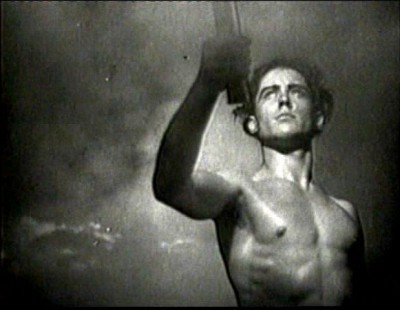
Few things sound less likely to be of interest to me than a documentary on the Olympics — any Olympics. But Leni Riefenstahl’s Olympia (1938), which documents the 1936 games held and staged in Nazi Germany, is a staggering work that defies categorization — and which functions as an often startling time capsule. Viewers may be surprised to find that the first 15-20 minutes of the film are an eroticized impression of the Greek ideal of the games that slowly and brilliantly transforms into the much more modest and less sexualized 1936 event. Yes, it’s hard to get away from the sense that this is perhaps less the Greek ideal than it is Hitler’s Aryan ideal, but that makes the footage no less remarkable — or any less influential (you can find echoes of it all over modern film). Of course, the bulk of the film involves the games themselves — in all their bombastic glory. There’s no denying that any film with Hitler among the spectators and masses of people (not all of them) giving out with the “Seig Heil” is just inherently disturbing — and this certainly is. It’s also part of what makes the film so utterly fascinating. As a record of the games, it ought to be shown to every wet-behind-the-ears TV producer as a template for how to do it. I have never seen any modern presentation — regardless of its technical polish — that came within miles of capturing the excitement of the Olympics, or the humanity of the participants. Is the film Nazi propaganda? Yes and no. Partly, that “no” comes from the fact that Hitler couldn’t control the outcome of the events — and while the film never shows the Führer fuming over things like Jesse Owens’ unstoppable victories (and you know he must’ve been livid), Riefenstahl doesn’t shortchange Owens. In fact, he’s one of the most personalized and lingered on of all the athletes. One wonders how she dared. But there are a number of things that are surprisingly subtle — like how little the Nazi flag is included in the shots. Maybe it was thought to be unnecessary since the immense and flamboyant show itself has Nazi Germany written all over it. Whatever the case, it’s just one more point of fascination in the film.
Classic World Cinema by Courtyard Gallery will present Olympia Friday, Oct. 5 at 8 p.m. at Phil Mechanic Studios, 109 Roberts St., River Arts District, upstairs in the Railroad Library). Info: 273-3332, www.ashevillecourtyard.com




I may have to overcome my aggressive indifference toward sport and add this to my to-view list.